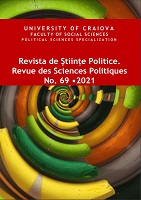Democracy and socialism before and after the fall of the Berlin Wall: An analysis of the interpretations of the intellectual and activist Francisco Weffort in Brazil
Democracy and socialism before and after the fall of the Berlin Wall: An analysis of the interpretations of the intellectual and activist Francisco Weffort in Brazil
Author(s): Rafael Marchesan Tauil, Luciléia Aparecida Colombo, Terrell CarverSubject(s): Political history, Marxism, Government/Political systems, Post-War period (1950 - 1989), Transformation Period (1990 - 2010)
Published by: Editura Universitaria Craiova
Keywords: Democracy; Socialism; Intellectuals; Marxism; Post-communism; Weffort;
Summary/Abstract: This article presents Francisco Weffort’s principal interpretations concerning socialism and democracy. The research was conducted taking in account his articles and books, written between 1979 and 1992. We argue that his thought about socialism and democracy, developed during his academic career later underpinned his participation in the central nucleus of the Workers' Party (PT), first as general secretary between 1983 and 1987 (before the fall of Berlin Wall) and after as the main coordinator of Lula’s presidential campaign in 1994 (after the fall of Berlin Wall). His theorizations were initially in tune with Western Marxism in Brazil, when a group of intellectuals tried to comprehend Marx writings from a scientific approach, trying to leave aside the Leninist political perspective, adopted by the Brazilian Communist Party. This perspective influenced the PT from its foundation in 1980 until the late 90’s. The Worker’s Party emerged proclaiming himself as a socialist revolutionary party, built by workers, trade unions, Catholic Church believers and intellectuals but not by politicians. The party arose as a new option for the Brazilian society, which were tired of old politicians. That is why the scientific approach (far from political perspectives) used to interpret Marx by this group of intellectuals was deeply connected with the party, which denied the importance of politics and had the revolutionary socialist horizon as target. After some time as a PT’s member in the late 1980s, Weffort started to privilege the role took by politics in his analysis and writings under the influence of Eurocommunism, through the reception of Gramsci in Brazil. This reception was responsible for an interpretative turn in his work, when he began to privilege democratic political ways instead of a revolutionary rupture as a path to be achieved in the Brazilian political horizon. Our hypothesis is sustained by the idea that the writings about democracy and socialism are deeply connected to the period before and after Berlin Wall and can be seen as an excellent portrait of the dilemma lived by many Brazilian (and worldwide) intellectuals, the paradox represented by the opposition of a socialist revolutionary scenario versus the democratic way.
Journal: Revista de Științe Politice. Revue des Sciences Politiques
- Issue Year: 2021
- Issue No: 69
- Page Range: 191-200
- Page Count: 10
- Language: English

